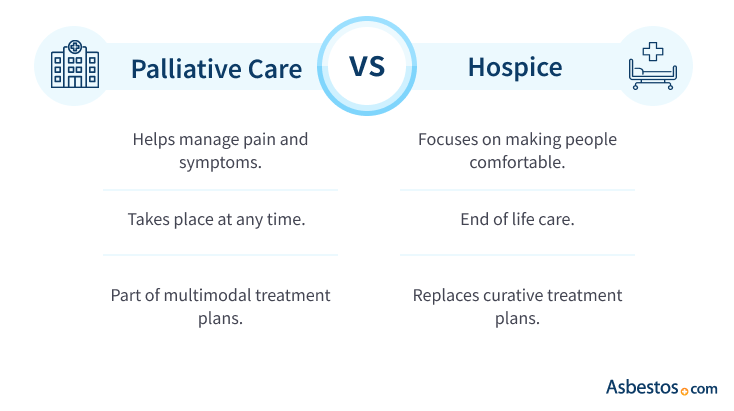
Connect with top-rated doctors specializing in mesothelioma treatment, who will personalize treatment options based on your diagnosis.
Find Your SpecialistPalliative care for mesothelioma includes surgery, radiation, chemo and immunotherapy. The goal is to improve quality of life. Starting palliative care early can ease symptoms. While it can be paired with curative treatment, palliative care’s goal isn't to cure mesothelioma.
Palliative care is a type of mesothelioma treatment that focuses on your physical comfort, not necessarily the cancer. A diverse team of specialists work together to ease your symptoms and treatment side effects using a variety of different strategies.
Palliative Care Strategies for Mesothelioma
People report feeling more comfortable thanks to palliative care for malignant mesothelioma while they go through tough treatments like recovering from aggressive surgery. Your doctors can help you choose the treatments that will help you the most.
Palliative treatment not only eases mesothelioma symptoms, but it can improve survival. An Australian study found that when people got help for poor appetite, their survival rates improved. The authors of a 2024 study in Current Oncology concluded palliative care should be included in every mesothelioma treatment plan.
A 2023 study in the British Journal of Community Nursing showed palliative care helps early-stage mesothelioma patients. For many, palliative care for mesothelioma also helps them spend more time at home instead of in the hospital.
Many people with mesothelioma undergo multimodal therapy, or a combination of therapies. They may experience side effects from each therapy or intensified overlapping side effects. Palliative care can help manage these effects.
The palliative treatment that will benefit you the most depends on the specific type of mesothelioma you have, the treatments you’re undergoing, and how far your cancer has progressed. Talk to your mesothelioma care team about how you’re feeling and your personal goals.
Providing palliative care for mesothelioma is a group effort typically involving a team of experts. This team often includes cancer doctors, surgeons, nurses, pain management specialists and licensed dietitians. They work as a unit to ensure you get the care you need.
Physical therapists, physical rehabilitation specialists and respiratory therapists also play critical roles in palliative care. Exercise during treatment, for example, not only helps people improve their strength and overall health, but it can reduce mesothelioma symptoms. Breathing exercises with a respiratory therapist can improve lung function. Talk to your care team about possibly working with other types of palliative care specialists.

Connect with top-rated doctors specializing in mesothelioma treatment, who will personalize treatment options based on your diagnosis.
Find Your SpecialistPalliative treatment can include many of the same treatments for mesothelioma used to try to cure or slow the disease. Surgery, chemo, immunotherapy, and radiation can all reduce symptoms and improve quality of life. Surgeries like thoracentesis or pleurodesis remove or prevent fluid buildup, easing breathing.
Low-dose chemo and radiation can shrink tumors, which may relieve pressure or reduce pain. Immunotherapy may also support comfort and function with fewer side effects than chemo. These treatments, while often considered curative, can play a vital role in mesothelioma palliative care, focusing on comfort, function and overall quality of life.
Chemotherapy is an anti-cancer treatment for mesothelioma, but it can also play a role in palliative care. The side effects of chemotherapy can be harsh. Medications can reduce the negative effects, so patients can benefit from chemo.
Chemotherapy Administration
Chemotherapy is most often used on its own but is also used following surgery. HIPEC can extend life expectancy for mesothelioma patients. HITHOC hasn’t been found to provide as much benefit but can be beneficial for some patients.
Immunotherapy can improve mesothelioma survival and quality of life. Many patients experience fewer side effects compared to chemo.
Some palliative treatments can affect immunotherapy. Opioids prescribed for pain and corticosteroids for inflammation have immunosuppressive effects. The impact of antibiotics on healthy gut bacteria may impact immunotherapy.
Radiation can shrink tumors, helping to relieve the pain they can cause. While it can cause skin irritation and fatigue, it’s useful for improving quality of life.
Radiation is used almost exclusively in pleural mesothelioma. It does not work for pericardial cases and is hard to use in peritoneal mesothelioma.
Palliative surgery for mesothelioma can relieve the symptoms caused by fluid build-up like pleural effusions. Fluid accumulation can cause difficulty breathing, pain and other complications.
Fluid-Draining Procedures
Cytoreductive surgery is an invasive surgery to remove as much of the tumor as possible. It can have palliative benefits such as controlling symptoms.
Surgery and medication can help relieve certain types of mesothelioma pain. Mild pain may be treated with over-the-counter pain relievers such as acetaminophen. More severe pain is usually treated with opioid drugs. Examples of these drugs include morphine, oxycodone or tramadol. IV pain medication may be needed for severe pain.
Other pain management techniques can be helpful as well. While pain originates in the body, it’s interpreted in the brain. Cognitive and behavioral techniques may help you manage your pain.
Techniques to Manage Mesothelioma Pain
Palliative care may improve your symptoms and increase mesothelioma life expectancy. Complementary and alternative medicine isn’t recommended to replace traditional treatment. But it may offer symptomatic relief and improve your quality of life.
Many patients find relief with a holistic approach to palliative care. Some combine medication for anxiety and depression along with talk therapy and yoga.

Doctor-approved exercises to help mesothelioma patients maintain strength and manage treatment side effects.
Get Your Free GuideYou can improve your mesothelioma diet with help from a licensed dietitian. Proper nutrition gives your body strength to heal and helps your immune system stay strong during treatment. A balanced diet is important because it gives your body the fuel it needs to fight illness and recover.
Mesothelioma treatments like chemo or radiation can affect how food tastes and how your body digests it. Some treatments may cause nausea, vomiting or a loss of appetite. These side effects can make it hard to eat enough healthy food.
To eat well, try to eat small meals more often, drink plenty of water and include foods with protein and calories. Prescription drugs can help increase appetite and ease nausea. Always talk with a licensed dietitian or your care team before making changes to your diet.
If you have mesothelioma, eating more produce can help to build a healthy body. Research shows that fruits and vegetables can help fight cancer.
These types of mesothelioma care overlap but are distinct. Supportive care is an umbrella of care that includes palliative therapies for physical symptoms and side effects and adds emotional and psychological support to help people cope with a mesothelioma diagnosis. Supportive care takes a holistic approach to addressing your needs.
Hospice can also include types of palliative care and supportive care to make people more comfortable. But while palliative care can happen at any time on your mesothelioma journey, hospice care is end-of-life care.
Both hospice and palliative care aim to help people with mesothelioma feel more comfortable, but they’re different. Palliative care can be given at any stage of mesothelioma. It often starts soon after diagnosis and continues during treatment to ease symptoms and improve quality of life.
Hospice care, on the other hand, focuses only on comfort when a person has stopped all curative treatments. People in hospice care are usually close to the end of their lives, and the care centers on making their remaining time as comfortable and meaningful as possible.
Patient Advocate Karen Selby explains, “There’s still a lot of confusion about what palliative treatment is versus hospice care. I find it important to explain how patients typically do better integrating palliative care early on rather than waiting.”
Palliative treatments might include surgery, radiation, chemo or other medications. These therapies can help improve breathing and reduce extra fluid buildup in the chest and abdomen.

Palliative care focuses on easing mesothelioma symptoms and the side effects from treatment. Supportive care goes further and addresses not only physical needs but also the emotional and psychological challenges of living with mesothelioma. Mental health professionals, Patient Advocates and support groups play important roles in helping people manage stress, depression and anxiety.
Mental health support is a vital part of supportive care. Living with mesothelioma can bring fear, sadness and anxiety, all of which may affect sleep, appetite and how well someone handles treatment. Mesothelioma survivor Michael Cole shared how mental health support helped him after his extrapleural pneumonectomy surgery and chemotherapy for pleural mesothelioma.
He tells us, “It had become almost impossible for me to sleep, and I began using mild medication to help. My thoracic surgeon recommended I speak with a psychiatrist. [They] explained how trauma to the body interacts with brain function, which can cause a loop effect leading to more pain and stress.”
Palliative treatment focuses on helping you feel better, managing symptoms like pain or trouble breathing. Curative treatment, on the other hand, tries to remove or destroy the cancer and stop it from coming back. While palliative care can use curative treatments like immunotherapy and surgery, the aim for this use of those therapies is to help improve your comfort and quality of life while undergoing other treatments to fight the cancer.
Yes, most insurance plans cover palliative care for mesothelioma. Coverage includes private insurance, Medicare and Medicaid. Coverage depends on your plan and the type of care you need, so make sure to check with your insurance provider. You can also talk to our Patient Advocates to help you understand what’s covered and what you may have to pay for out of pocket.
Yes, many types of palliative care for mesothelioma can be provided at home. Home-based care may include help with pain management, breathing support, nutrition and mobility. It can also reduce the need for hospital visits and help you stay more comfortable in your daily routine. Your doctor or care team can help set up in-home services that match your needs and insurance coverage.
Before starting palliative care for mesothelioma, talk to your doctor about the symptoms that bother you the most, like pain or trouble breathing. Ask what treatments can help you feel better and what side effects to expect. You should also talk about your goals, like wanting to stay active or spend more time at home. Ask where you can get care, how often you’ll need it and if your insurance will help pay for it. Also, ask how your palliative care can work with other treatments and how it might affect you in the long run.
Stay up-to-date on treatment, research, clinical trials, doctors and survivors
The information on this website is proprietary and protected. It is not a substitute for professional medical advice, diagnosis or treatment. Any unauthorized or illegal use, copying or dissemination will be prosecuted. Please read our privacy policy and terms of service for more information about our website.
This website and its content may be deemed attorney advertising. Prior results do not predict a similar outcome.
The Mesothelioma Center’s claim as the most trusted resource is based on our more than 150 5-star Google and BBB reviews. Our organization also helps more than half of all mesothelioma patients annually diagnosed.
Your web browser is no longer supported by Microsoft. Update your browser for more security, speed and compatibility.
If you are looking for mesothelioma support, please contact our Patient Advocates at (855) 404-4592
The Mesothelioma Center at Asbestos.com has provided patients and their loved ones the most updated and reliable information on mesothelioma and asbestos exposure since 2006.
Our team of Patient Advocates includes a medical doctor, a registered nurse, health services administrators, veterans, VA-accredited Claims Agents, an oncology patient navigator and hospice care expert. Their combined expertise means we help any mesothelioma patient or loved one through every step of their cancer journey.
More than 30 contributors, including mesothelioma doctors, survivors, health care professionals and other experts, have peer-reviewed our website and written unique research-driven articles to ensure you get the highest-quality medical and health information.
My family has only the highest compliment for the assistance and support that we received from The Mesothelioma Center. This is a staff of compassionate and knowledgeable individuals who respect what your family is experiencing and who go the extra mile to make an unfortunate diagnosis less stressful. Information and assistance were provided by The Mesothelioma Center at no cost to our family.LashawnMesothelioma patient’s daughter


Asbestos.com. (2026, February 9). Managing Mesothelioma Pain With Palliative Treatment. Retrieved February 26, 2026, from https://www.asbestos.com/treatment/palliative/
"Managing Mesothelioma Pain With Palliative Treatment." Asbestos.com, 9 Feb 2026, https://www.asbestos.com/treatment/palliative/.
Asbestos.com. "Managing Mesothelioma Pain With Palliative Treatment." Last modified February 9, 2026. https://www.asbestos.com/treatment/palliative/.

Dr. Andrea Wolf is the Director of the New York Mesothelioma Program at Mount Sinai in New York City. She focuses on multidisciplinary treatment, clinical research, community outreach and education.
Our fact-checking process begins with a thorough review of all sources to ensure they are high quality. Then we cross-check the facts with original medical or scientific reports published by those sources, or we validate the facts with reputable news organizations, medical and scientific experts and other health experts. Each page includes all sources for full transparency.
Please read our editorial guidelines to learn more about our content creation and review process.
